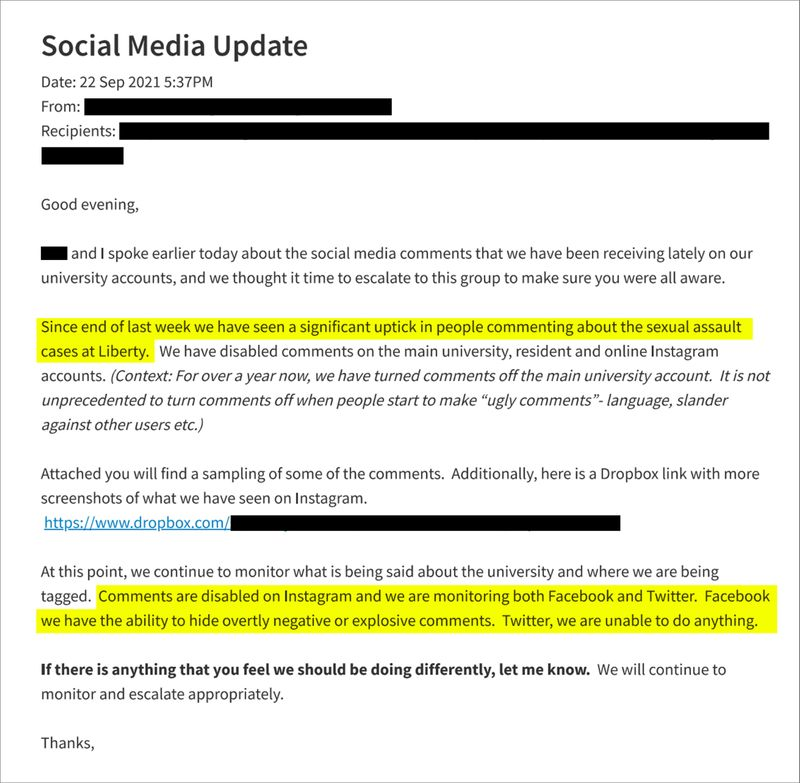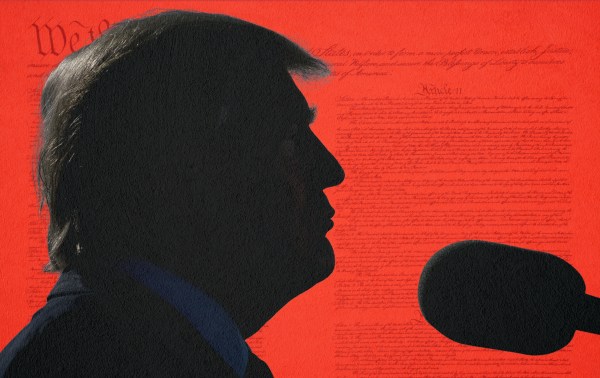The story of Elizabeth Axley, as told in this comprehensive ProPublica report alleging that Liberty University mishandled reports of sexual abuse, is difficult to read. At an off-campus party, she drank too much, her memory got hazy, she apparently passed out, and then when she woke up, she said a man was on top of her. She said he was covering her mouth, raping her.
When she got back to her dorm, she called the campus police, and they took her to the hospital, where “a nurse documented 15 bruises, welts and lacerations on her arm, face and torso.”
When Axley told her RA about the alleged attacks, she said the RA urged her not to report the incident. Axley had been violating the Liberty code of conduct—the “Liberty Way”—in part by drinking. But Axley reported it anyway. She had text messages supporting her claim. She had pictures (you can see them on the ProPublica report) taken at the hospital showing her injuries.
Yes, the young man denied wrongdoing. But she had supporting evidence. Her case was more than simply he-said, she-said.
But Liberty’s response was deeply disturbing. When Axley looked at the case file, she said the pictures of her wounds weren’t there. Why? She claims that a school official told her they were “too explicit.” She said she was asked to “sign a document acknowledging that she could be found to have violated the university’s code of conduct.”
Ultimately the university ruled that the accused student was “not responsible” for the rape, but—as ProPublica notes—the decision letter had some rather stark omissions, including “the text messages from friends that weekend expressing concern about what had taken place,” and “the photographs of her bruises and cuts.”
Axley’s story goes much deeper than the brief summary above. She attempted suicide. The young man briefly sued her (before they entered into a settlement agreement), but I highlight her case because I find the year of her claims particularly intriguing. She alleged she was raped in 2017, and in that year Liberty University was flying very high indeed.
In fact, it’s arguable that in that moment no single university in the United States was more directly politically influential than Liberty. The president of the university, Jerry Falwell Jr., was a friend of the president of the United States. He was one of his first and most prominent unabashed supporters of Donald Trump.
But at the same time that young women were alleging that the school was deterring them from reporting dreadful sexual misconduct because they’d been drinking, their own school president was an open and notorious drunk. His wife was accused of affairs with younger men, and one of those men claimed that Falwell liked to watch.
And what of the POTUS who granted Liberty's president so much access and whom so many members of the Liberty community adored? He was of course just emerging from a presidential race in which he’d paid a porn star for silence about their affair and had his own extraordinarily checkered past, including appearing in a soft-core Playboy porn movie called Playmate 2000: Bernaola Twins.
The Liberty Way, it should be emphasized, does not approve of pornography.
Rarely in my life have I ever seen a single significant American institution face such a staggering run of scandal and controversy as Liberty University, and Liberty happens to be America’s largest Christian college, the place that prides itself of education “champions for Christ.”
At the beginning of the Trump presidency, Liberty was a juggernaut. Its president, Jerry Falwell Jr., had rescued the school from financial peril, built the endowment to more than $1 billion, and presided over its growth into an educational enterprise that enrolled almost 100,000 students (the vast majority are online). To put that number in perspective, Liberty’s enrollment placed it close to the enrollment of the entire Ivy League.
Arguably no other university president in America spent more time in the Oval Office than Falwell. The school started a “think tank” called the Falkirk Center (named after Falwell and Turning Point USA co-founder Charlie Kirk) and named as “fellows” a number of pop culture celebrities of the Trumpist right. Liberty was rich. It was powerful. It was influential.
Correction: It is rich. It is powerful. It is influential. It’s also in a state of moral collapse.
It’s difficult to quickly summarize Liberty’s scandals, but let’s try. On August 25, 2020, Falwell resigned as president of the university. It’s hard to say that any single action or scandal ended his tenure. He posted “provocative photos” on social media. His wife, Becki, had an affair with a pool boy the Falwells had met on vacation. The pool boy alleged that Falwell was aware of the affair and even watched them have sex.
The hits kept on coming. A former student alleged that Becki had sexually exploited him at the Falwell family home. Falwell sued the university, then dropped the suit. The university then sued Falwell for more than $10 million, claiming that Falwell had withheld key information from the school while he negotiated the terms of his severance agreement.
The Falwell scandal was bad enough, but it was but a harbinger of worse things to come. In July a dozen women filed a federal lawsuit against Liberty, alleging that the school systematically mishandled allegations of sexual harassment and assault and created an “unsafe campus environment.” Here’s the core claim:
Liberty University has created an unsafe campus environment in three key ways: (a) the creation and weaponization of a student honor code called “the Liberty Way” that makes it difficult or impossible for students to report sexual violence; (b) the promotion of a tacit but widely observed policy that condoned sexual violence, especially by male student athletes; and (c) the public and repeated retaliation against women who did report their victimization.
A complaint of course presents only one side of the story. The university has ample opportunity to respond. But then, in October, ProPublica put considerable flesh on the bones of the plaintiffs’ complaint. It published its own comprehensive investigation of the university. ProPublica also focused on how the “Liberty Way” put young women through a unique ordeal as they made claims of dreadful sexual misconduct:
Three students, including Axley, recalled being made to sign forms acknowledging possible violations of the Liberty Way after they sought to file complaints about sexual assaults. Others say they were also warned against reporting what had happened to them. Students say that even Liberty University police officers discouraged victims from pursuing charges after reporting assaults.
The day after ProPublica ran its story, Liberty’s former spokesman, Scott Lamb, sued the university, claiming—as the Washington Post wrote—that “the school fired him after he opposed its handling of a series of sexual assault and harassment complaints.”
Lamb has detailed steps that Liberty took to suppress public criticism on social media. The ProPublica report contains this email, which it says was sent by the marketing department to university officials:

Ironically enough, the university’s former Falkirk Center, now called the “Standing for Freedom” Center, is very much against online censorship.
Last week, a website called the Roys Report reported that the university gave large financial gifts to ministries run by school trustees. It also highlighted a speech by former Liberty board chair Allen McFarland claiming that he “got in trouble, trouble big time” after he said “things like, ‘We’re raising champions for Christ, not champions for the Republican Party. We’re raising champions for Christ, not champions for Donald Trump.’”
He was replaced as board chair by Tim Lee, a prominent evangelist.
I know that there are knowledgeable readers who are at this very moment yelling at their computer screens, “David, you’re barely scratching the surface!” Indeed, an entire season of the documentary podcast series Gangster Capitalism is dedicated to unfolding scandals at Liberty, and Politico has produced a number of deeply reported stories detailing the profoundly dysfunctional culture at the university. The rot runs deep.
But I also know there are readers who are yelling different things at the screen. “David, why are you doing this? Why are you once again highlighting the failures of a Christian institution when we all know that the rot runs deep in secular progressive spaces? After all, don’t you know that Yale Law School is overrun with scandal?”
Indeed I do. My colleague Sarah Isgur and I spent much of a podcast exclusively talking about Yale this week. Controversies at Yale matter. The place is disproportionately powerful and disproportionately influential.
But Liberty also matters, and it matters a great deal. First, and most importantly, Liberty’s virtue matters for the victims of sexual assault and sexual abuse on campus. Few people are more vulnerable, more frightened, and more alone than individuals who’ve been abused and violated.
When I read story after story of mishandled claims—all occurring against the backdrop of the thunderous success of the university’s fundraising and enrollment—I was reminded of a different powerful Christian institution, Kanakuk Kamps, which ignored red flag after red flag that it had a superpredator in its midst. After all, he was so successful. He was so appreciated. The applause for him was thunderous.
And thus we see powerful institutions of the church create horrifying double standards. The more powerful and successful you are, the greater the grace for your personal conduct. But if you’re powerless? Well then, the rules apply, with a vengeance. After all, this is a Christian ministry, and there are standards to uphold.
When Ravi Zacharias was first accused of sexual misconduct, he refused to turn over his personal technology for examination and investigation. Would his ministry have permitted a junior employee to withhold his phones and/or computers?
If there’s one lesson to learn from listening to the invaluable podcast “The Rise and Fall of Mars Hill,” which traces the reasons for the collapse of Mark Driscoll’s immense Seattle church, it’s that success often becomes its own suit of armor, degrading character requirements in leaders until the sin and abuse become too overwhelming to ignore. Then everyone wonders (once again), “How did this go on so long?”
But these double standards fail in light of biblical commands. There is no one too important for consistent accountability. A person can’t be promoted out of character requirements, just because they can deliver people and profits. After all, Christ himself said, “Truly, I say to you, as you did it to one of the least of these my brothers, you did it to me.”
This represents an inversion of the world’s order. Prioritize the powerless. The last shall be first.
Second, as a Christian ministry, it is Liberty’s sacred responsibility to be “salt” and “light.” Again, here are the words of Jesus:
You are the salt of the earth, but if salt has lost its taste, how shall its saltiness be restored? It is no longer good for anything except to be thrown out and trampled under people's feet.
“You are the light of the world. A city set on a hill cannot be hidden. Nor do people light a lamp and put it under a basket, but on a stand, and it gives light to all in the house. In the same way, let your light shine before others, so that they may see your good works and give glory to your Father who is in heaven.
Numbers and dollars are not synonyms for salt and light. Otherwise, there are multiple secular organizations that are blazing forth with much greater radiance than Liberty. They have more money. They have more influence. Yet some of them have also struggled with profound scandal.
But this gets to a third point. The frustration at those who highlight scandals within the church is directly contrary to the emphasis of the church fathers. If anyone could claim to be an embattled minority, it was the early church. If anyone could claim that they were beset by overpowering cultural forces, it was the early church. American evangelicalism is the most powerful political faction in one of the two most powerful political parties in the most powerful nation in the history of the world. Early Christians would be gobsmacked at our influence.
Yet in 1 Corinthians 5, when the church was but a tiny presence in a vast empire, surrounded by a debauched culture, Paul demanded that the church purge from its presence those who committed “immorality that is not even tolerated among the Gentiles.” And then he wrote these oft-ignored words: “For what have I to do with judging outsiders? Is it not those inside the church whom you are to judge? God judges those outside. ‘Purge the evil person from among you.’”
A few days ago I was eating dinner with a small group of students at a Christian university, and the subject of post-liberalism came up. A person directly asked me why I seemed to object to formally seeking Christian governance in the United States. I answered his question with a question, “Why do you think it would be better than what we have?”
I was thinking both historically and presently. Historically, one could arguably locate the apex of Protestant power in the United States as somewhere around the time of Prohibition. After all, Christians were powerful enough to pass a constitutional amendment banning alcohol, all as part of an effort to improve public morals and public health.
Yet what was the state of American righteousness at that time of apex Christian power? Lynch mobs roamed the South. The entire region was an oppressive nation-within-a-nation, largely cut off from the rule of law. Anti-Catholic Blaine Amendments proliferated across the United States. Not even religious liberty was safe when Christians ruled.
And what about the present? Its largest institutions reel from scandal. A great mass of its members have succumbed to conspiracy theories. Its “religious” anti-vaxxism is claiming lives by the thousands.
Liberty’s current president, Jerry Prevo, was caught on tape saying that “getting people elected” was one of the “main goals” of its think tank. But given the staggering failures outlined above, who can trust Liberty’s wisdom in electoral politics?
But there is hope. There is always hope. The scandal-ridden flyspeck of a Corinthian church was ultimately part of a movement that fundamentally transformed the world. Indeed, Paul’s stern correction itself has been part of a persistent call for reform across two millennia of church scandals. There is always a check on sin. There are always voices crying in the wilderness.
Liberty is responding to its failures. As ProPublica reports, it has expanded amnesty policies when students self-report violations of the Liberty Way (though there are concerns about the policies’ implementation).
The school has also commissioned an independent investigation of the way it’s handled sexual assault claims. Prevo has told students, “I can tell you this, we’re not going to try to cover up anything, we’re going to look back, have that investigated. And also, if we’ve done wrong, we’re going to correct that wrong the best we can. I’m not here to cover up.” These are good words.
But that investigation is insufficient, at least so far. In the face of a staggering amount of corruption, the institution should commission a far more comprehensive inquiry. In the the tweet thread linked below, one of America’s most important attorney-experts in sexual abuse in the church, Rachael Denhollander, outlines the necessary steps for true institutional introspection and true institutional change:
Tens of thousands of Americans have attended Liberty University and had wonderful experiences. There are thousands of students and alumni and hundreds of faculty members who not only do their best to live out the values of their faith, they’re grieved by the corruption in their institution. They don’t see enrollment numbers and donor dollars as proof of righteousness.
They want change. They want repentance. And they understand that no matter the condition of the world around their university, its humility and obedience are imperative. The future is grave for the church in America if its salt loses its taste or its light goes out.
One more thing …
The new podcast is here! And the inaugural episode gets real deep, real fast. My friend and co-host Curtis Chang and I discuss Liberty and the concept of institutional sin. Curtis lays out a theology of institutions that will make you think.
Are institutions really “created in the image of God”? Does that include secular institutions? And how should Christians respond to institutional failures when they feel besieged by a more-powerful culture.
These questions (and more) are asked and answered (to the best of our ability, anyway) in the inaugural episode. Please give it a listen—and subscribe to the podcast feed—here.
One last thing …
Last week I featured a song by Tenielle Neda, and the response was overwhelming. You loved her. So here she is, back by popular demand, with a beautiful song looking forward to ultimate redemption, when all things are indeed made new:







Please note that we at The Dispatch hold ourselves, our work, and our commenters to a higher standard than other places on the internet. We welcome comments that foster genuine debate or discussion—including comments critical of us or our work—but responses that include ad hominem attacks on fellow Dispatch members or are intended to stoke fear and anger may be moderated.
With your membership, you only have the ability to comment on The Morning Dispatch articles. Consider upgrading to join the conversation everywhere.